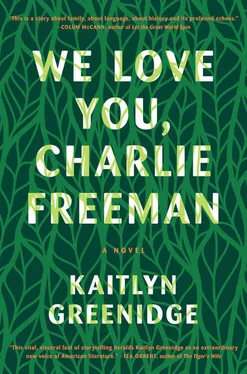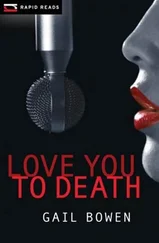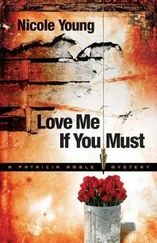My one small personal pleasure, though, my contemplation of the beautiful and courageous hussies of the Police Gazette , was ruined once Dr. Gardner showed up because the children were always coming in to complain, when they should be outside, hallooing and leaving me in peace. And the other Stars, of course, were furious with me and implied that I had misled them, because the drawings hadn’t stopped and their children were annoyed.
Fed up, I went outside myself one afternoon and found Dr. Gardner again, crouched close to a game of jacks with that obnoxious sketch pad. I explained to him that I thought we had an agreement and he would leave after his pictures were done.
“But I can’t,” he bleated. “I haven’t sketched nearly enough.” He didn’t bother to stand up or stop watching the game as we talked. He squatted in the dirt, his eyes intent on the dull flash of gunmetal in the dust.
I stood over him. “Sketch what you can today and then I am going to have to ask you to leave.”
Of course, he did not have to do what I told him. He was a white man in the black part of town. The law was on his side and he could return as often as he liked. But that wouldn’t have suited him. He wanted to be liked , you see. That was his weakness. He wanted us, all of us Negroes, to like and maybe even to love him. It’s why the children grew uneasy around him. Dr. Gardner was too eager, too solicitous. When they barged into my quiet school room to complain, each and every one of them, “Miss Ellen, why can’t that crazy white man just yell at us or leave us alone?”
“Please, Miss Jericho.” Dr. Gardner was still in the dirt at my feet. “Please. Just let me draw the children a few more times.”
“I can’t allow it.”
And here he turned cunning. Because he really did make a study of people, and I think, from our first conversation, he knew my weakness. “I’ll leave if you let me draw you instead,” he said.
Nobody ever thinks a plain old woman can be vain, but I agonize over my appearance. I spend hours in the mirror before class, my pin safely hidden away, attending to the wisps of hair that still stand up in graying licks, despite the hot comb. I wash and cream my face three times a day. I do this despite the fact my skin’s been dull for years. Whatever extra money I have after paying my boardinghouse fee and paying the barbershop for its old Police Gazette s, I spend on very small bottles of sharp scent which I have the courage to wear no place, except on the occasion of going to bed early on a Friday evening.
So when Dr. Gardner said, “Let me draw you instead,” I am ashamed to say I only slightly hesitated.
“I suppose I’ll do it,” I said. “If you really agree to leave my pupils alone.”
“I swear I will.” He stood up now, dusted his knees. “Come to my rooms tomorrow afternoon.” When I hesitated he shook his head slightly. “The landlady will let you in.”
“Then I definitely can’t come. She’ll spread it around the whole town and I’ll lose my position.”
“Then come when she’s not at home, through the back way. By the road closest to the woods. We’ll make sure no one sees you, I promise.”
A Star shines because of self-denial. I thought of those women in the Police Gazette . I thought of my seven-year-old self, flower of the Northern Negro Race. I thought of the sweet surrender of knowingly making a mistake, and knowing, hoping, things would be fine despite it all. No Negro I’d ever heard of or met had ever done that. I thought of those cinched waists on newsprint, tossed into the fire when I was through with them, twisting up into annihilation.
“Yes,” I said.
Laurel told her daughters that they were special. This was why the Toneybee Institute wanted them. “You know how many families applied to do this?” she said in the months leading up to the move. “So many. But ours was the only one with kids who already knew how to sign. I was the only one with girls that smart.”
They knew how to sign because Laurel was special, too. She had grown up as the only black girl in the state of Maine. Or, if not technically the only one, then at least the only one in a one-hundred-mile radius. She always said it that way, too, a “one-hundred-mile radius,” so that Callie and Charlotte imagined a large bull’s-eye, its red rings hovering over the state’s borderlines. The small dark circle at the rings’ center was Laurel.
Laurel’s father, Theodore Quincy, was a former serviceman. Her mother Nancy was a seamstress. Together they bought a Christmas tree farm in Farragut, Maine, because they liked its solitude.
They never explained to Laurel what awful noises of the world had driven them to choose the muteness of assimilation. Each morning, Nancy Quincy stood at her stove and stirred a pan of oatmeal. Theodore Quincy sat behind her at the kitchen table staring out through the window, cutting down every tree he saw with his eyes.
Theodore and Nancy had not counted on it being so hard, so very, very hard, to be the only black family in a one-hundred-mile radius. But it was too late to give up, once the place was bought and Laurel was born. To admit defeat would have broken what little heart they had left. Nancy and Theodore willed themselves to believe that this life was best for Laurel. At least she wasn’t a hooligan. At least she wasn’t running the streets of Boston. She had air and trees and an overpowering sky tamping down to meet her. That had to count for something.
“None of the white people ever said anything outright mean to us,” Laurel lied to her daughters. By which she meant that she allowed herself to remember only once or twice when someone called her “nigger.” She would never say that word out loud to her girls. “It wasn’t like that,” she explained. “It was just the opposite. They were always so polite. They were so polite it nearly killed me.”
For Laurel, growing up in Farragut felt like the whole world was holding its breath around her. As she moved from her home to the road leading to school and back again, she entered a kind of airless delirium. Her favorite sound in the world was that of the soles of her own penny loafers scuffing on gravel as she walked to school. It was realer than the scrape of her mother’s tin spoon in the pan of oatmeal at the stove or the click in the back of her father’s throat as he lit imaginary fires behind his eyes and dreamed of burning pines. Whenever Laurel shuffled her loafers over the gravel, she shut her eyes and opened her mouth, tried to swallow that noise and keep it safe in the well of her neck. When the indifference of town overwhelmed her, she’d hum and hum until she brought back up the sound of her own shoes on gravel.
Once she reached town, the atmosphere was even tighter, like a lung suspended in motion. At school, the teachers spoke in loud, bright voices to try to draw her out but never named the thing that made her different.
On the playground, children screeched and ran and skipped, and Laurel sat beneath a pine tree and watched them. She rubbed a patch of sap between her fingers, and every time the stickiness pulled at the skin there, she closed her eyes in gratitude for the pain. Each stinging smack told her brain and her skin and her blood, “I am here, I exist, I am here.”
It was in this climate of reticence — never being asked more than what was polite, never being spoken to first in public, always being courteously omitted, the eschewal of ever naming things outright — that Laurel grew to hate the failures of the spoken word.
By the time she was ten years old, she had had enough. She stopped speaking. She still talked at home, but out in the streets of Farragut, she wrote everything down on a notepad with a golf pencil she nicked from the bank. She wrote notes to the grocer; to her teachers; to the few classmates who directed conversation her way. She wrote notes to the wind and the trees and the stars — her companions — and she tore up the paper as soon as she was finished writing and dropped fistfuls of it around the farm, to ensure their delivery.
Читать дальше










![Ally Carter - [Gallagher Girls 01] I'd Tell You I Love You But Then I'd Have to Kill You](/books/262179/ally-carter-gallagher-girls-01-i-d-tell-you-i-lo-thumb.webp)

